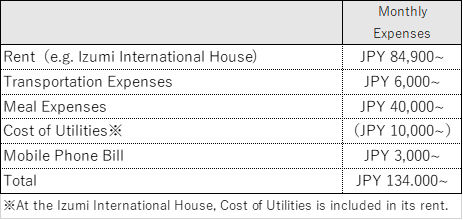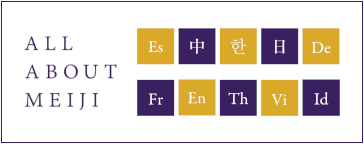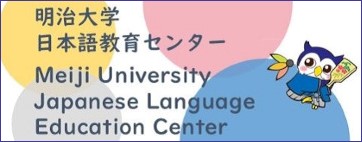About Meiji University
Campuses
We have 4 campuses in the heart of Tokyo, one of the world's political, economic, academic, and cultural centers.
SURUGADAI campus:1-1 Kanda-Surugadai, Chiyoda-ku, Tokyo
SURUGADAI campus:1-1 Kanda-Surugadai, Chiyoda-ku, Tokyo
IZUMI campus:1-9-1 Eifuku, Suginami-ku, Tokyo
IKUTA campus:1-1-1 Higashi-Mita, Tama-ku, Kawasaki-shi, Kanagawa
NAKANO campus:4-21-1 Nakano, Nakano-ku, Tokyo
Features of Exchange Student Program at Meiji University
Meiji University have agreements with 382 universities in 59 countries and regions (as of March 2025), including student exchange agreements with 279 universities in 46 countries and regions. We accept approximately 200 exchange students from all over the world every semester.
●List of our partner universities
Exchange students belong to either one of the undergraduate or graduate school during their mobility.
In recent years, we increase the number of specialized courses offered in English, it makes possible exchange students who does not hold Japanese language skills to study abroad at Meiji.
(Reference) List of English subjects that exchange students can take <PDF> <excel>
Additionally, all exchange students are able to take Japanese language classes that are appropriate for one's level.
●List of our partner universities
Exchange students belong to either one of the undergraduate or graduate school during their mobility.
In recent years, we increase the number of specialized courses offered in English, it makes possible exchange students who does not hold Japanese language skills to study abroad at Meiji.
(Reference) List of English subjects that exchange students can take <PDF> <excel>
Additionally, all exchange students are able to take Japanese language classes that are appropriate for one's level.
(1)Classes and Language
Of the 13,000 class sessions offered at Meiji University, 12,000 are conducted in Japanese. For this reason, those applying for admission to the exchange student program are generally required to have a certain level of Japanese-language proficiency.
Please refer to the application guideline for details on the available schools that exchange student can apply for.
[Undergraduate schools/Graduate schools that require Japanese language proficiency and its JLPT level] Refer to pages 3 and 4 of application guideline.
[Undergraduate schools/Graduate schools that can accept students in English and required English proficiency and its scores] Refer to page 5 of application guideline.
Please refer to the application guideline for details on the available schools that exchange student can apply for.
[Undergraduate schools/Graduate schools that require Japanese language proficiency and its JLPT level] Refer to pages 3 and 4 of application guideline.
[Undergraduate schools/Graduate schools that can accept students in English and required English proficiency and its scores] Refer to page 5 of application guideline.
(2)Academic Advisors
Academic advisors provide assistance in creating study plans according to the interview held at Meiji University and consultation for study and student life. Upon their arrival in Japan, exchange students will meet with their academic advisors and create study plans. There may be restrictions on the classes a student may take based on their Japanese proficiency level.
Undergraduate exchange students (other than the school of Science and Technology and the school of Agriculture) are assigned the academic advisor according to preferred field of study, preferred classes at Meiji, language proficiency (Japanese or English) and study plan.
Undergraduate exchange students (other than the school of Science and Technology and the school of Agriculture) are assigned the academic advisor according to preferred field of study, preferred classes at Meiji, language proficiency (Japanese or English) and study plan.
(3)Supervisors, Seminars/Laboratories (“Zemi”)
①Supervisors provide instruction directly to students in seminars/laboratories (“zemi”). Seminars/laboratories are comprised of 10–20 students and encourage active discussions with the supervisors. Students participating in these seminars/laboratories are able to interact with other students (excluding students in the English Track of the Graduate School of Governance Studies).
②Not all students can participate in the seminars/laboratories. Participation depends on Japanese-language proficiency and the number of seats available. Upon their arrival in Japan, exchange students will meet with their academic advisors and create study plans that include these seminars/laboratories if appropriate.
③Students accepted into the English Track of the Graduate School of Governance Studies will not participate in a seminar.
<Notes>
Applicants to the school of Science and Technology, graduate schools apart from the graduate school of Business Administration, the school of Agriculture who wish to study under a supervisor of the school of Agriculture are required to choose the preferred supervisors in the online application. Please note you are not necessarily assigned the supervisor which you chose in the online application. A Supervisor will be decided by your undergraduate/graduate school according to the interview held at Meiji University upon your arrival.
②Not all students can participate in the seminars/laboratories. Participation depends on Japanese-language proficiency and the number of seats available. Upon their arrival in Japan, exchange students will meet with their academic advisors and create study plans that include these seminars/laboratories if appropriate.
③Students accepted into the English Track of the Graduate School of Governance Studies will not participate in a seminar.
<Notes>
Applicants to the school of Science and Technology, graduate schools apart from the graduate school of Business Administration, the school of Agriculture who wish to study under a supervisor of the school of Agriculture are required to choose the preferred supervisors in the online application. Please note you are not necessarily assigned the supervisor which you chose in the online application. A Supervisor will be decided by your undergraduate/graduate school according to the interview held at Meiji University upon your arrival.
Application
(1)Application Schedule

※This schedule is for reference only. For more detail, please refer to the application guideline.
※Exchange students need to be nominated by home Univeveristy before you complete online application.
Please check the internal schedule with outbound coordinator of your home University.
Please check the internal schedule with outbound coordinator of your home University.
(2)Application details
Academic Calendar & Course Numbering
Curriculum, Faculties and Syllabus
Here is a list of Undergraduate/Graduate Schools which exchange students can apply for.
Exchange students need to choose one of those at the time of online application.
Please make sure in which school you would like to study during your mobility becuase it is not possible to change your school after the online application.
●Undergraduate Schools
●Graduate Schools
Exchange students need to choose one of those at the time of online application.
Please make sure in which school you would like to study during your mobility becuase it is not possible to change your school after the online application.
●Undergraduate Schools
●Graduate Schools
Japanese Language Classes
Japanese Lanugage classes are open to all of exchange students.
Please note that the campus where you take Japanese classes will vary depending on the school you belong to.
(1)Surugadai Campus; Other than School of Global Japanese Studies(Undergraduate)
(2)Nakano Campus; Only for School of Global Japanese Studies(Undergraduate)
Please note that the campus where you take Japanese classes will vary depending on the school you belong to.
(1)Surugadai Campus; Other than School of Global Japanese Studies(Undergraduate)
(2)Nakano Campus; Only for School of Global Japanese Studies(Undergraduate)
(1)Surugadai Campus; Other than School of Global Japanese Studies(Undergraduate)
Japanese-language class level is decided according to the placement test held at Meiji University and is not ascertained before arrival. Japanese-language class varies according to Japanese language proficiency.
【Introductory, beginners and students with skills equivalent to level N5-N2 of JLPT (the Japanese Language Proficiency Test)】
Japanese 1-8 are offered by Japanese Language Programs for International Students.
<Course Outline> <Syllabus>
【Students with skills equivalent to level N1 of JLPT】
Japanese (Advanced) is offered by Japanese Language Programs for International Students. Also, Japanese language classes and Japanese Culture & Society offered by each undergraduate school are available.
<Course Outline> <Syllabus>
* Japanese language classes and Japanese Culture & Society offered by each undergraduate school are not available.
* Students in the school of Global Japanese Studies are able to take Japanese language classes offered by the school of Global Japanese Studies. Japanese language classes listed above are not available. Please refer to below (2).
* Course availability is subject to change.
【Introductory, beginners and students with skills equivalent to level N5-N2 of JLPT (the Japanese Language Proficiency Test)】
Japanese 1-8 are offered by Japanese Language Programs for International Students.
<Course Outline> <Syllabus>
【Students with skills equivalent to level N1 of JLPT】
Japanese (Advanced) is offered by Japanese Language Programs for International Students. Also, Japanese language classes and Japanese Culture & Society offered by each undergraduate school are available.
<Course Outline> <Syllabus>
* Japanese language classes and Japanese Culture & Society offered by each undergraduate school are not available.
* Students in the school of Global Japanese Studies are able to take Japanese language classes offered by the school of Global Japanese Studies. Japanese language classes listed above are not available. Please refer to below (2).
* Course availability is subject to change.
(2)Nakano Campus; School of Global Japanese Studies(Undergraduate)
Exchange students in the School of Global Japanese Studies (SGJS) can register for Japanese courses offered by SGJS at Nakano Campus. SGJS students cannot take Japanese courses in the Japanese Language Program offered at other campuses.
For further information on Japanese language classes, please see below.
[Beginners and students with Japanese proficiency equivalent to JLPT N5 to N2 level]
Students can register for “Introductory Japanese” to “Pre-advanced Japanese”.
[Students with Japanese proficiency equivalent to JLPT N1 level]
Students can register for “Advanced Japanese”.
[Students who wish to pass the Japanese Language Proficiency Test (N1/N2)]
Students may take "JLPT Preparation (Intermediate)” (for N2) and "JLPT Preparation (Advanced)" (for N1) at the School of Global Japanese Studies. Students must pass a level-check test in the first class to enroll in the "JLPT Preparation".
The Japanese language courses you will take will be determined based on the results of the placement test conducted by SGJS after your arrival in Japan, so your class will not be determined prior to your arrival. The courses you can take will depend on your Japanese language proficiency.
Textbooks, handouts, tests, and other materials used in Japanese language classes are all in Japanese (hiragana, katakana, and kanji). In particular, students who have never studied Japanese should make sure to learn to read and write hiragana and katakana on their own before the start of class.
Chart1: List of Japanese language courses’ numbers of classes per week and credits
For more detail, please see the website below:
Japanese Language Program | English Track Program | Undergraduate Schools
For further information on Japanese language classes, please see below.
[Beginners and students with Japanese proficiency equivalent to JLPT N5 to N2 level]
Students can register for “Introductory Japanese” to “Pre-advanced Japanese”.
[Students with Japanese proficiency equivalent to JLPT N1 level]
Students can register for “Advanced Japanese”.
[Students who wish to pass the Japanese Language Proficiency Test (N1/N2)]
Students may take "JLPT Preparation (Intermediate)” (for N2) and "JLPT Preparation (Advanced)" (for N1) at the School of Global Japanese Studies. Students must pass a level-check test in the first class to enroll in the "JLPT Preparation".
The Japanese language courses you will take will be determined based on the results of the placement test conducted by SGJS after your arrival in Japan, so your class will not be determined prior to your arrival. The courses you can take will depend on your Japanese language proficiency.
Textbooks, handouts, tests, and other materials used in Japanese language classes are all in Japanese (hiragana, katakana, and kanji). In particular, students who have never studied Japanese should make sure to learn to read and write hiragana and katakana on their own before the start of class.
Chart1: List of Japanese language courses’ numbers of classes per week and credits
| Level | Course | Classes per week | Credit |
| Advanced | Listening A/B | 1 each | 1 each |
| Reading A/B | 1 each | 1 each | |
| Speaking A/B | 1 each | 1 each | |
| Writing A/B | 1 each | 1 each | |
| Pre-advanced | General | 3 | 3 |
| Vocabulary & Kanji | 1 | 1 | |
| Upper-intermediate | General | 3 | 3 |
| Vocabulary & Kanji | 1 | 1 | |
| Intermediate | General | 3 | 3 |
| Vocabulary & Kanji | 1 | 1 | |
| Pre-intermediate | General | 3 | 3 |
| Vocabulary & Kanji | 1 | 1 | |
| Elementary | General | 3 | 3 |
| Vocabulary & Kanji | 1 | 1 | |
| Introductory | General | 3 | 3 |
| Vocabulary & Kanji | 1 | 1 |
| Course | Classes per week | Credit |
| JLPT Preparation (Advanced) | 1 | 1 |
| JLPT Preparation (Intermediate) | 1 | 1 |
For more detail, please see the website below:
Japanese Language Program | English Track Program | Undergraduate Schools
Examination, Grades and Academic Transcript
(1) Examination and Grades
As a rule, first-semester exams are held in late July while second-semester exams are held in late January. Grades are generally announced every semester. There are five possible grades: S (90 points or higher), A (80 to 89 points), B (70 to 79 points), C (60 to 69 points), F (59 points or lower: Fail). A grade of C or better is required to earn credits from a course.
Note: Methods for evaluating student grades differ by school/graduate school.
Note: Methods for evaluating student grades differ by school/graduate school.
(2) Academic Transcripts
The timing of transcript issuance is subject to change without notice due to reasons such as grade processing. your term of study, one (1) copy of your transcript in English will be sent to your home university.
*The timing of transcript issuance is subject to change without notice due to reasons such as grade processing.
**In principle, our office cannot send the official transcripts before the transcript issuance period.
| Semester | Program ends | Transcript Issuance Period |
| Spring | End of July | Mid-October 2025 or later |
| Fall | Early February | Late-April 2026 or later |
*The timing of transcript issuance is subject to change without notice due to reasons such as grade processing.
**In principle, our office cannot send the official transcripts before the transcript issuance period.
Dormitories
(1) Conditions of application for dormitory
In order to apply for the dormitory of Meiji University, students must agree with the conditions listed below.
Those who do not agree with any of the conditions are NOT allowed to apply for nor stay in the dormitory of Meiji University.
In case the number of applicants exceeds the capacity of all dormitories, please understand that we may request some applicants to find their accomodation on their own.
① Housing arrangement
(1) Housing arrangement for each student will be decided by Meiji University depending on the state of acceptance of exchange students each semester. For this reason, only those who are willing to stay in any of the dormitories can apply for a room (6 dormitories are available as of Fall Semester, 2025 AY).
You may not be assigned as you wish. In this case, you are NOT allowed to refuse, or decline the dormitory after the housing arrangement is decided.
Students must follow the regulations regarding the smoking and drinking in the dormitory. Furthermore, there are several dormitories which prohibits from access to building and rooms occupied by opposite gender.
Students must follow these regulations when staying in dormitory. In case you foresee difficulty, you must not apply for the dormitory and are asked to arrange the accommodation by yourself.
(2) Students are NOT allowed to select, refuse, or decline any particular dormitory in their application
or after the housing arrangement is decided. (See 【3】 Overview of the dormitory for exchange students and housing arrangement.)
(3) Any changes nor cancellations of the dormitory are not acceptable after submitting the online application. For this reason, it is strongly recommended that students consider the conditions of each dormitory and their student life before complete the online application.
② Period of stay and rent
(1) The period of your occupancy of the room is from the first day of the check-in dates (during the orientation weeks) to about 1 week after the last day of the classes and final exams, which will be designated by Meiji University. The rent are calculated based on the occupancy period. Rent will be charged for the whole period.
(2) Rent is charged to each resident depending on the period of the occupancy. The rent of the first month and the last month of the occupancy is calculated by daily rate of the rent.
Payment is basically made per semester designated by Meiji University academic calendar.
Residents are required to pay the whole rent for the first one semester (about 5 months) before arrival. Residents who study at Meiji for 1 year are required to pay the rent for second semester after arrival before the start of the second semester.
(3) The fees which have once been paid to the university shall not be refundable for whatever reason. Meiji University does not make any settlement nor refund to the residents, regardless of the actual check-in and check-out dates.
Those who do not agree with any of the conditions are NOT allowed to apply for nor stay in the dormitory of Meiji University.
In case the number of applicants exceeds the capacity of all dormitories, please understand that we may request some applicants to find their accomodation on their own.
① Housing arrangement
(1) Housing arrangement for each student will be decided by Meiji University depending on the state of acceptance of exchange students each semester. For this reason, only those who are willing to stay in any of the dormitories can apply for a room (6 dormitories are available as of Fall Semester, 2025 AY).
You may not be assigned as you wish. In this case, you are NOT allowed to refuse, or decline the dormitory after the housing arrangement is decided.
Students must follow the regulations regarding the smoking and drinking in the dormitory. Furthermore, there are several dormitories which prohibits from access to building and rooms occupied by opposite gender.
Students must follow these regulations when staying in dormitory. In case you foresee difficulty, you must not apply for the dormitory and are asked to arrange the accommodation by yourself.
(2) Students are NOT allowed to select, refuse, or decline any particular dormitory in their application
or after the housing arrangement is decided. (See 【3】 Overview of the dormitory for exchange students and housing arrangement.)
(3) Any changes nor cancellations of the dormitory are not acceptable after submitting the online application. For this reason, it is strongly recommended that students consider the conditions of each dormitory and their student life before complete the online application.
② Period of stay and rent
(1) The period of your occupancy of the room is from the first day of the check-in dates (during the orientation weeks) to about 1 week after the last day of the classes and final exams, which will be designated by Meiji University. The rent are calculated based on the occupancy period. Rent will be charged for the whole period.
(2) Rent is charged to each resident depending on the period of the occupancy. The rent of the first month and the last month of the occupancy is calculated by daily rate of the rent.
Payment is basically made per semester designated by Meiji University academic calendar.
Residents are required to pay the whole rent for the first one semester (about 5 months) before arrival. Residents who study at Meiji for 1 year are required to pay the rent for second semester after arrival before the start of the second semester.
(3) The fees which have once been paid to the university shall not be refundable for whatever reason. Meiji University does not make any settlement nor refund to the residents, regardless of the actual check-in and check-out dates.
(2) Estimated total amount of rent

As of May 2025, we will offer 6 dormitories above for exchange students in Fall 2026.
For the details of each dormitory, please refer to the websites using the links below.
Please note that each rent is as of November 2025, and it is subject to change in the future.
(3) Overview of the dormitories
(4) Arrange the accommodation by yourself (Look for housing by yourself)
Exchange students who do not apply for the dormitories arranged by Meiji University need to rent an apartment or shared house on their own.
Once you select “Look for housing by yourself” in the online application form, Meiji University dormitory cannot be arranged for you. (You can’t apply for the Meiji University dormitory after submitting the online application.) For this reason, it is strongly recommended that students consider the conditions of each option and their student life before the online application.
Please note that those who stay at long-stay hotels or Airbnb might not register as residents and join the National Health Insurance. You must be sure the resident of the accommodation can register them.
For more details on how to find accommodation in Tokyo, please refer to the following website.
https://www.meiji.ac.jp/cip/english/admissions/finding_accommodation_in_tokyo.html
Once you select “Look for housing by yourself” in the online application form, Meiji University dormitory cannot be arranged for you. (You can’t apply for the Meiji University dormitory after submitting the online application.) For this reason, it is strongly recommended that students consider the conditions of each option and their student life before the online application.
Please note that those who stay at long-stay hotels or Airbnb might not register as residents and join the National Health Insurance. You must be sure the resident of the accommodation can register them.
For more details on how to find accommodation in Tokyo, please refer to the following website.
https://www.meiji.ac.jp/cip/english/admissions/finding_accommodation_in_tokyo.html
VISA application
Students with non-Japanese nationalities have to obtain a "Student" visa to come to Japan.
Please submit an application for a Certificate of Eligibility (COE), which is required to obtain a visa, along with your online application.
This Certificate of Eligibility will be sent to you by email along with your admission letter approximately two months before your arrival in Japan.
Once you receive the email, please apply for a visa at the Japanese embassy or consulate in your country or region.

The Certificate of Eligibility takes two to three months from application (②) to issuance (③).
If you miss the submission deadline stated in the application guidelines, your arrival in Japan may be delayed.
So please be sure to submit your application by the deadline.
If you have dual citizenship and hold Japanese nationality, you do not need a visa and can enter the country with a Japanese passport.
However, please note that you must maintain your Japanese nationality during your study abroad period.
Please submit an application for a Certificate of Eligibility (COE), which is required to obtain a visa, along with your online application.
This Certificate of Eligibility will be sent to you by email along with your admission letter approximately two months before your arrival in Japan.
Once you receive the email, please apply for a visa at the Japanese embassy or consulate in your country or region.
The Certificate of Eligibility takes two to three months from application (②) to issuance (③).
If you miss the submission deadline stated in the application guidelines, your arrival in Japan may be delayed.
So please be sure to submit your application by the deadline.
If you have dual citizenship and hold Japanese nationality, you do not need a visa and can enter the country with a Japanese passport.
However, please note that you must maintain your Japanese nationality during your study abroad period.
Tips for life in Tokyo
(1) Living Expenses in Tokyo
Tokyo is known around the world as being one of the most expensive places to live. The average monthly expenses of an exchange student are listed below. Do your own research, and be sure you have the funds necessary to cover your expenses.

Notes:
• According to the Japan Student Services Organization, monthly living expenses in Tokyo are generally estimated to be about 150,000 JPY.
• If you are going to be moving into a new place, keep in mind that you will also have to buy new furnishings and other supplies. You will also have to pay rent and a deposit, and in most cases, other fees such as key money (remuneration paid to a landlord) and agency fees are also required.

Notes:
• According to the Japan Student Services Organization, monthly living expenses in Tokyo are generally estimated to be about 150,000 JPY.
• If you are going to be moving into a new place, keep in mind that you will also have to buy new furnishings and other supplies. You will also have to pay rent and a deposit, and in most cases, other fees such as key money (remuneration paid to a landlord) and agency fees are also required.
(2) Costs during stay in Japan
You should be prepared to pay the following costs during stay in Japan:

(3) Insurances
The following insurances are required for all exchange students during the exchange program.
①National Health Insurance
After arriving in Japan, you need to complete application for National Health Insurance at the time you register your living place at the ward office.
Nationa Health Insurance covers 70% of the medical costs at the hospital and the patient will only have to pay balanced 30%.
A payment slip for the insurance premium will be mailed to your dormitory or apartment, and you can pay it at a bank or convenience store.
②Meiji University Student Health Insurance
When you have a medical treatment at the hospital affiliated with Meiji University, it become free of charge because the university will cover 30% of cost which is not covered by National Health Insurance.
After the start of the semester, payment slip will be distributed at the counter of each faculty office.
However, not all illnesses, injuries, or accidents are covered by National Health Insurance or Meiji Student Health Insurance.
It is highly recommend to exchange students to purchase study abroad insurance, travel insurance, etc that includes personal liability insurance in your own country.
(In the event of a major injury or illness that requires expensive treatment, medication, or hospitalization that is not covered by insurance, etc.)
①National Health Insurance
After arriving in Japan, you need to complete application for National Health Insurance at the time you register your living place at the ward office.
Nationa Health Insurance covers 70% of the medical costs at the hospital and the patient will only have to pay balanced 30%.
A payment slip for the insurance premium will be mailed to your dormitory or apartment, and you can pay it at a bank or convenience store.
②Meiji University Student Health Insurance
When you have a medical treatment at the hospital affiliated with Meiji University, it become free of charge because the university will cover 30% of cost which is not covered by National Health Insurance.
After the start of the semester, payment slip will be distributed at the counter of each faculty office.
However, not all illnesses, injuries, or accidents are covered by National Health Insurance or Meiji Student Health Insurance.
It is highly recommend to exchange students to purchase study abroad insurance, travel insurance, etc that includes personal liability insurance in your own country.
(In the event of a major injury or illness that requires expensive treatment, medication, or hospitalization that is not covered by insurance, etc.)
(4) Health management
●Inoculations are recommended before coming to Japan. It is strongly recommended that a student have inoculations against measles, mumps, and rubella before coming to Japan.
● A student with a disease under treatment or who needs follow-up care. Some medicines might not be available in Japan. When medication and medical attention
in Japan are continuously necessary, bring your medicine and have your physician make a reference letter. In the reference letter, please list information about the treatment and medication you are currently receiving in English. Information for those who are bringing medicines for personal use into Japan is as follows. If you bring medicine to Japan, you need to obtain permission from the Ministry of Health, Labour and Welfare.
Please read the following websites carefully, and don’t forget to complete the necessary procedures.
https://www.mhlw.go.jp/english/policy/health-medical/pharmaceuticals/01.html
Application for Import Confirmation
https://impconf.mhlw.go.jp/aicpte/page/login.jsp?lang=en#
●There is not many hospitals or clinics available in English.
● A student with a disease under treatment or who needs follow-up care. Some medicines might not be available in Japan. When medication and medical attention
in Japan are continuously necessary, bring your medicine and have your physician make a reference letter. In the reference letter, please list information about the treatment and medication you are currently receiving in English. Information for those who are bringing medicines for personal use into Japan is as follows. If you bring medicine to Japan, you need to obtain permission from the Ministry of Health, Labour and Welfare.
Please read the following websites carefully, and don’t forget to complete the necessary procedures.
https://www.mhlw.go.jp/english/policy/health-medical/pharmaceuticals/01.html
Application for Import Confirmation
https://impconf.mhlw.go.jp/aicpte/page/login.jsp?lang=en#
●There is not many hospitals or clinics available in English.
Others(Useful links)
- Regarding Campusmate (Student support group for International Students)
- Regarding MuBO (Meiji University Borderless Organization)
- Library
- Student counseling room
- Using sport facilties
- Meiji university student health insurance
- Club activities at Meiji
- International students guidebook
- Search for clinics with English support
- NHKWORLDJAPAN /Multilingual Portal; Japan Life and Bosai
- Learn about earthquakes
- Living in Japan:How to Open a Bank Account and Send Money







